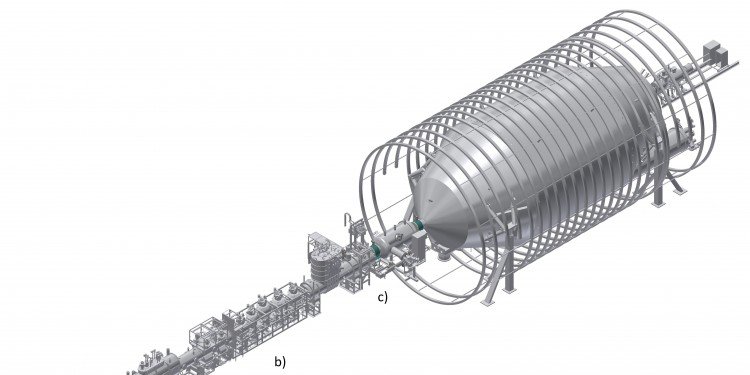
New results for the mass of neutrinos
Apart from photons, the fundamental quanta of light, neutrinos are the most abundant elementary particles in the universe. As they possess a small non-zero mass, these “light-weights of the universe” play a key role in cosmology and particle physics. The most precise scale for neutrinos in the world is the international experiment "KATRIN" at the Karlsruhe Institute of Technology, in which scientists of the University of Münster are also involved. With this experiment, the scientists have now succeeded in measuring the mass of the neutrinos with unprecedented precision.
“The fact that it took KATRIN only a few weeks to provide a world-leading sensitivity and to improve on the multi-year campaigns of the predecessor experiments by a factor of 2 demonstrates the extraordinary high potential of our project,” says Prof. Christian Weinheimer from the Institute of Nuclear Physics at Münster University. He is one of the two long-term co-spokespersons of the KATRIN experiment.
Christian Weinheimer and his research group have made significant contributions to the KATRIN experiment in recent years. The 700 square meter wire electrode system of the spectrometer, the precise high voltage and several calibration sources were developed and manufactured in Münster. The team of physicists, engineers and technicians and the institute's workshops have created special scientific instruments of the highest precision. The Münster scientists also played a major role in the first neutrino mass analysis now presented: The important response function of the experiment was measured with new time-of-flight methods. "Without these new methods, we would never have been able to achieve this accuracy in such a short time," emphasize the two task leaders Dr. Volker Hannen and Dr. Alexey Lokhov from Münster University.
The KATRIN collaboration involves 20 institutions from seven countries. In addition to the Karlsruhe Institute of Technology, the German members are the Humboldt University Berlin, Bonn University, Fulda University of Applied Sciences, the Max Planck Institute for Nuclear Physics in Heidelberg, Mainz University, the Max Planck Institute for Physics in Munich, the Technical University of Munich, the University of Münster and the University of Wuppertal.
